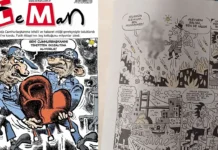Turkish government has reportedly removed the name of a famous Kurdish-Swedish novelist and poet Mehmed Uzun from a public park in Diyarbakır province in an apparent continuation of its crackdown on Kurdish cultural and linguistic symbols.
Speaking to Kurdistan 24 online news outlet, pro-Kurdish Peoples’ Democratic Party (HDP) Diyarbakır deputy İmam Taşçıer has said a government-appointed trustee to a local municipality gave orders to bring down Uzun’s name from the park which was built in 2013. Taşçıer has also added that authorities also took down a memorial there erected to honor Uzun’s poetry.
The park in Yenişehir, a central district of Diyarbakır, whose municipality Ankara government seized by deposing the elected co-mayors and their township council in December 2016 and appointing trustees in their stead to run local affairs. “We condemn this act. Trustees are working in a hostile way toward the Kurds and their culture. They are not from the people. They must immediately reverse this decision,” said Taşçıer, slamming what he called intolerance.
Taşçıer has alluded to the demolishment of a monument built in Diyarbakır to commemorate 34 civilian victims, mostly children, of a 2011 massacre committed by Turkish warplanes in the Roboski village and removal of other names and statues.
Uzun’s publisher Abdullah Keskin, whose Avesta was one of the first to release the former’s long-time banned books in Turkey, was also outraged at the Turkish authorities. “Mehmed Uzun had to leave his homeland when there was enormous suppression of Kurdish language. He wrote his first novels in exile, in the cold Scandinavia. Now they [the Turkish state] are targeting his legacy,” Keskin told Kurdistan 24 over the phone.
Uzun left Turkey as a political refugee in the aftermath of the 1980 military coup for Sweden, a country that became a second home to tens of thousands of Kurds from Kurdistan where they found the freedom to revive their suppressed culture.
Keskin said among the readership of Uzun who died of cancer in Diyarbakir only after two years of returning from the diaspora in 2007 were as many Turks as Kurds. “[Government] actions have no legitimacy in our eyes. What can they do by removing his name from a park? Uzun left his mark on Kurdish literature,” he said.
“They also removed Saladin’s name from a primary school in Bitlis [province] over the weekend,” Keskin revealed.
Saladin, arguably the most famous Kurd in history, was the founder of the Ayyoubi dynasty and liberator of Jerusalem from the Crusaders. “Have you heard of disrespect in the Western world toward Saladin? However, why is this happening in Turkey, a country boasting of being Ottoman Empire’s continuation? It is their inferiority complex, the [authorities’] wretched vileness. We are tired of this,” Keskin said.

“They also destroyed [the 17th-century poet and philosopher] Ahmadi Khani’s statue. They brought down Ceylan Önkol’s name [child killed by the army in 2009. They are repeating their historical crimes against us,” Keskin further said.
Turkish authorities in Diyarbakır has removed the name of a 12-year-old child, Ceylan Önkol who was killed with a mortar in 2009, from a public park. A Turkish government appointed trustee to the municipality of Diyarbakir’s Lice district named the park instead after another child victim, Fırat Simpil, 13, killed in 2015 by a bomb planted by the outlawed Kurdistan Workers’ Party (PKK) affiliates.
Turkish government has seized the Lice Municipality from the elected Mayor Rezan Zugurli and her city council in February 2017, appointing a sub-governor, Sinan Başak, to run the district’s affairs.
Önkol’s brother Vedat Önkol has said both his sister and Simpil, from the neighboring district of Silvan, were victims of the Turkish state-PKK conflict. “They could have opened a new park in memory of Fırat,” he said according to the T24 online news portal. “I have no words. Was Ceylan not a child too? We share the same pain with Fırat’s family. We are all from the same land. It is wrong to have removed a name,” Önkol said. He added that he still had not told his parents of the news.
Last month over 200 soldiers acting under orders by a governor had also raided a village in the Bingol province to level the grave of and monument in honor of a Peshmerga who died fighting the ISIL near Iraq’s Mosul.















